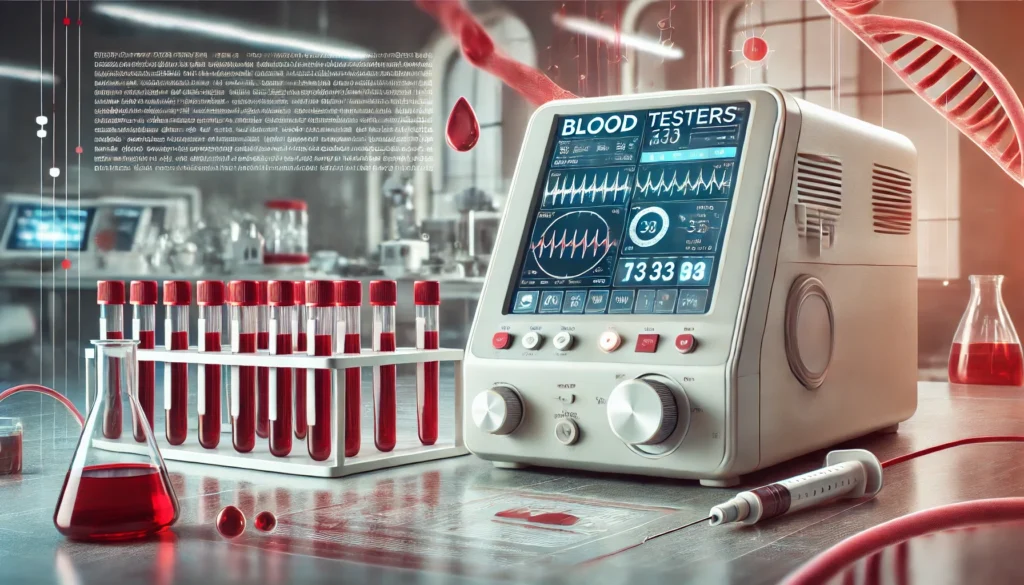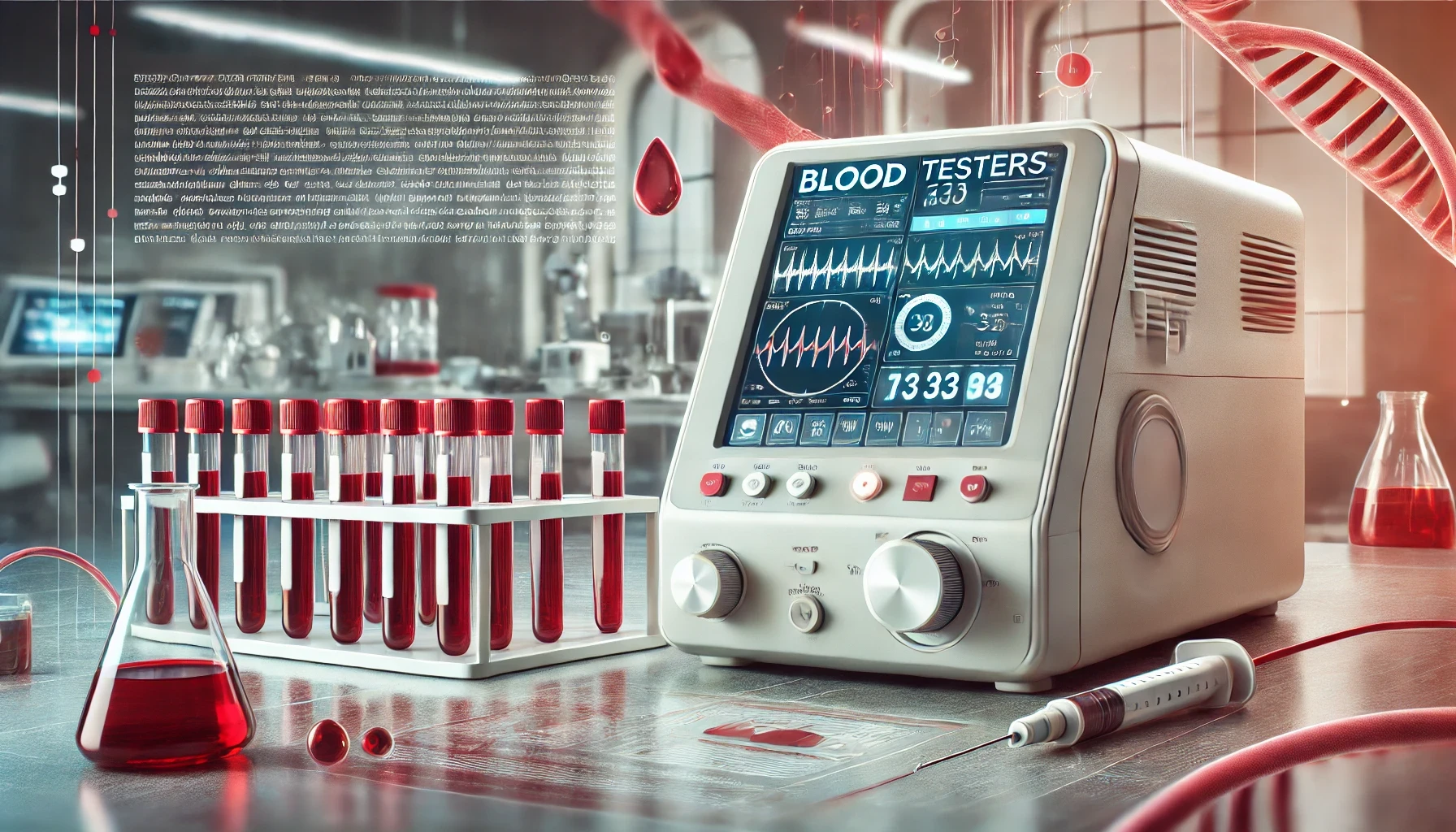Introduction
Blood testing is one of the most common and crucial diagnostic tools in modern healthcare. Blood testers, also known as blood analyzers, are the devices and instruments used to perform these tests, which can reveal a wealth of information about a patient’s health. From detecting infections and monitoring chronic conditions to determining blood types and measuring organ function, blood testers play an indispensable role in medical diagnostics and treatment.

Types of Blood Testers
Blood testers come in various forms, each designed for specific purposes. Here are some of the most common types:
- Hematology Analyzers: Hematology analyzers are used to count and characterize blood cells. These machines measure the number and types of red blood cells, white blood cells, and platelets in a blood sample. They are essential for diagnosing conditions like anemia, leukemia, and other blood disorders.
- Biochemistry Analyzers: These devices analyze the chemical components in blood, such as glucose, electrolytes, enzymes, and lipids. Biochemistry analyzers help in assessing kidney and liver function, monitoring metabolic conditions like diabetes, and evaluating other vital bodily functions.
- Coagulation Analyzers: Coagulation analyzers measure how quickly blood clots. These tests are critical for patients on anticoagulant therapy, individuals with clotting disorders, and those undergoing surgery. They help ensure that the blood’s ability to clot is within a safe range.
- Blood Gas Analyzers: Blood gas analyzers measure oxygen, carbon dioxide, and pH levels in the blood. These tests are vital in assessing respiratory and metabolic functions, particularly in critically ill patients or those with respiratory disorders.
- Immunoassay Analyzers: Immunoassay analyzers detect specific proteins, hormones, and other substances in the blood. These tests are commonly used to diagnose infections, detect cancer markers, and monitor hormone levels.
- Point-of-Care (POC) Blood Testers: POC blood testers are portable devices used for rapid testing at the patient’s bedside or in remote locations. These testers are widely used in emergency rooms, clinics, and for home monitoring of chronic conditions like diabetes.
How Blood Testers Work
Blood testers operate using various principles, depending on the type of test. Most work by analyzing a small blood sample, typically drawn from a vein or finger prick, and processing it through a series of chemical reactions, light-based measurements, or electrical signals. Advanced blood analyzers are highly automated, capable of performing multiple tests simultaneously, and delivering accurate results within minutes.
For example, hematology analyzers use techniques like flow cytometry and electrical impedance to count and differentiate blood cells. Biochemistry analyzers, on the other hand, use spectrophotometry, where light absorption by specific chemicals in the blood is measured to determine concentrations.
Advancements in Blood Testing Technology
Recent advancements in blood testing technology have significantly improved the speed, accuracy, and convenience of blood tests. Innovations like microfluidics, lab-on-a-chip technology, and artificial intelligence (AI) are driving these changes.
- Microfluidics: This technology allows for the manipulation of small volumes of blood in a controlled environment, enabling faster and more precise testing with less blood.
- Lab-on-a-Chip: These devices integrate multiple laboratory functions on a single microchip, allowing for complex testing procedures to be carried out on a small, portable device.
- Artificial Intelligence: AI algorithms are being used to analyze blood test results, identify patterns, and predict potential health issues, enhancing diagnostic accuracy and efficiency.
Applications of Blood Testers in Healthcare
Blood testers are utilized across a wide range of medical fields. Here are some key applications:
- Disease Diagnosis: Blood tests are often the first step in diagnosing diseases. Whether it’s identifying an infection, detecting cancer markers, or diagnosing autoimmune disorders, blood testers provide critical information that guides treatment decisions.
- Chronic Disease Management: For patients with chronic conditions like diabetes, cardiovascular disease, or kidney disease, regular blood testing is essential for monitoring the progression of the disease and adjusting treatments.
- Emergency Medicine: In emergency settings, rapid blood testing can be life-saving. Blood gas analyzers and POC devices allow healthcare providers to quickly assess a patient’s condition and make informed decisions.
- Personalized Medicine: Blood tests are increasingly being used in personalized medicine to tailor treatments to an individual’s genetic makeup. This approach can improve treatment outcomes and reduce side effects.
Challenges and Future Directions
Despite their importance, blood testers face several challenges. These include ensuring accuracy and consistency across different devices and settings, maintaining the affordability of tests, and addressing the invasive nature of blood sampling.
Looking ahead, the future of blood testing may include even more non-invasive methods, such as testing through skin sensors or breath analysis. Additionally, continued integration of AI and machine learning into blood testing processes could lead to even more personalized and predictive healthcare.
Conclusion
Blood testers are a cornerstone of modern medicine, providing critical insights that guide diagnosis, treatment, and monitoring of diseases. As technology continues to evolve, these devices will become even more integral to healthcare, offering faster, more accurate, and more personalized diagnostic options. Whether in a hospital, clinic, or home setting, blood testers will remain an essential tool in safeguarding health and improving patient outcomes.

